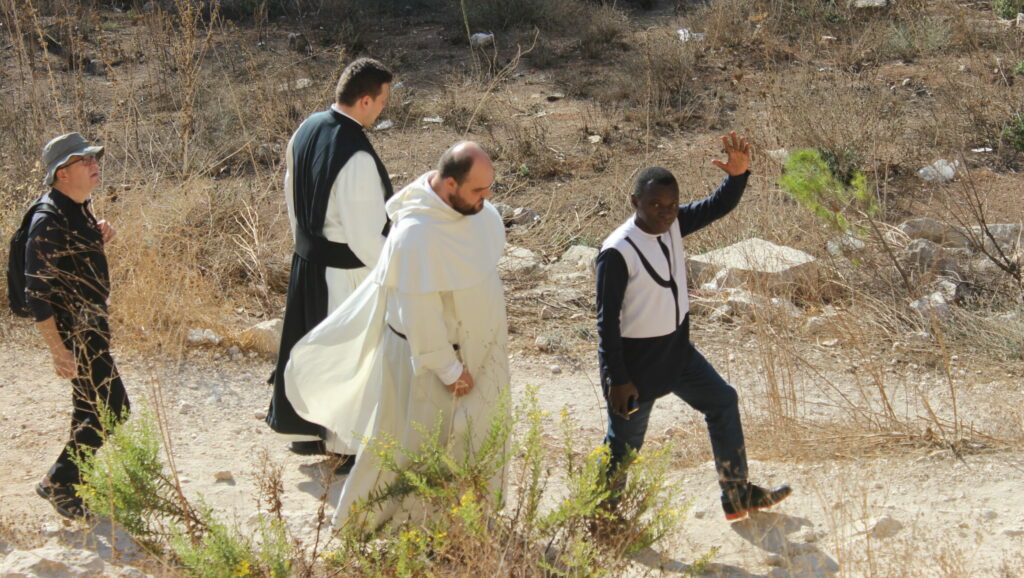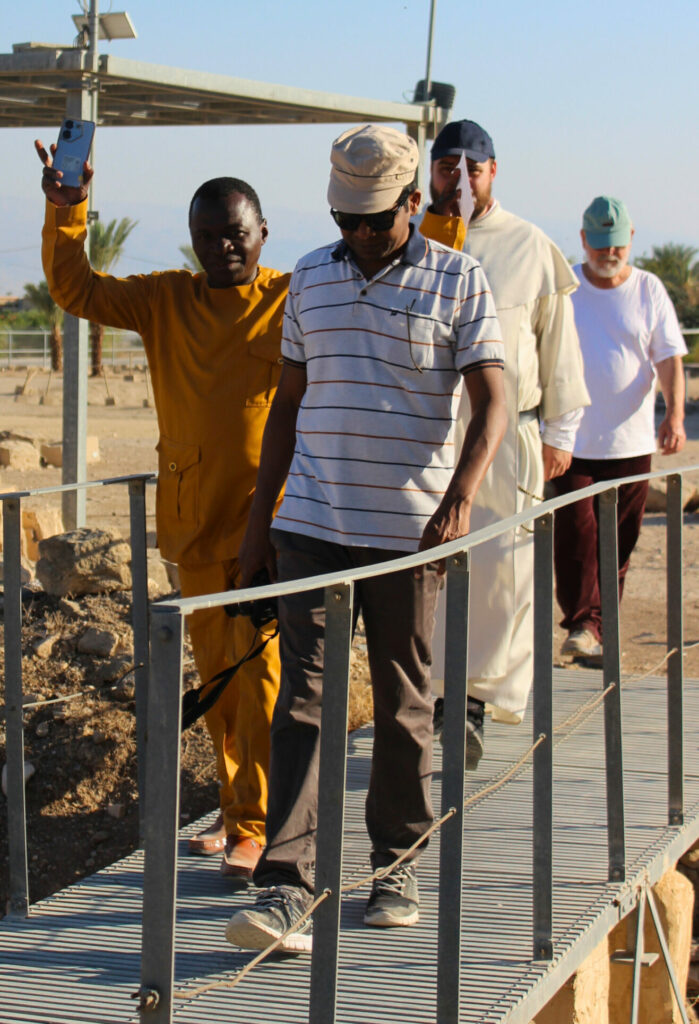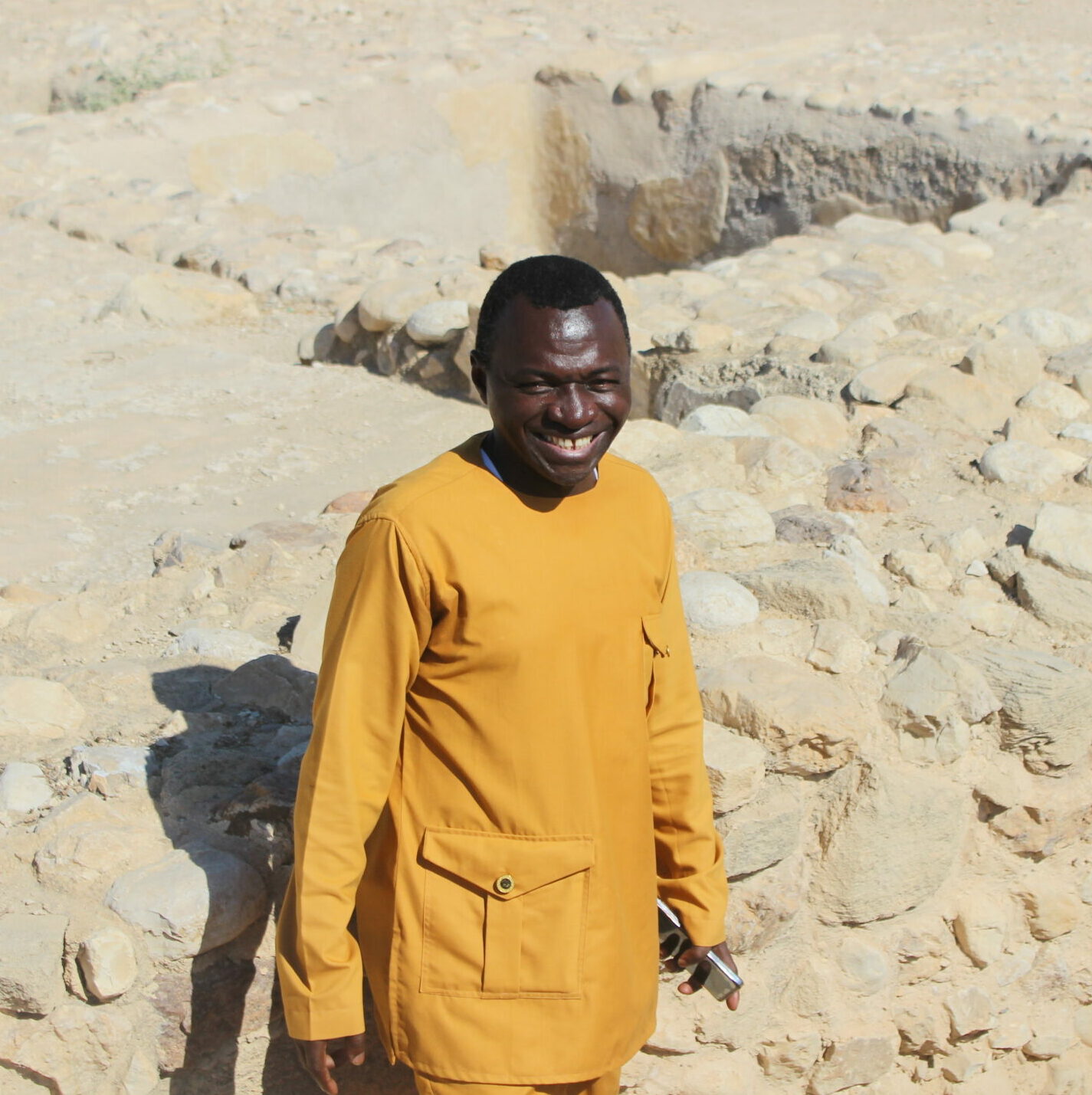Could you please introduce yourself?
I am Fr. Joseph-Théophile Ngouo, MSA, which means Missionary of the Holy Apostles. I come from the mountainous region of western Cameroon. After completing my term on the general council of our congregation, where I was responsible for formation, I spent a short time back in my country before taking a sabbatical year at ÉBAF, intending to rest but above all to undertake new projects.
Why did you choose the ÉBAF?
I find it to be the ideal place to live this sabbatical period in all its dimensions. At the end of my term on the general council, Msgr. Bishop Franco Martínez of the Diocese of Segovia (Spain), with whom I shared great friendship, trust, and esteem, strongly recommended it to me. ÉBAF is a profoundly spiritual place that fosters encounter with Christ through prayer, contemplation, and silence. It is also an academic and intellectual center that allows me to update my knowledge and prepare well before launching new formation projects. Moreover, it is a place of fraternal and communal life, which is very important for a member like me of an apostolic society to live within such a community. This communal dimension is essential to our society.
What is your academic project?
I am preparing to become a formator in one of our study houses in Cameroon and, as far as possible, to join the faculty of the Saint Cyprian Theological School in Ngoya (Yaoundé), which is affiliated with the Teresianum in Rome.
What have you discovered since coming to the ÉBAF ?
I have been here less than two months, but I have already learned a lot. I discovered one of the most wonderful sites in the Church dedicated to Saint Stephen — it is my first time seeing a place connected to the memory of the protomartyr of our Church. I believe this house also holds some of his relics, and it is a grace for me to spend time here. It is first and foremost a holy place, simultaneously a place of worship, prayer, and life. Everything is gathered here for me to have a wonderful stay. I have also met very welcoming, open people from various nationalities, which encourages me to learn more about them.
What do you see as strengths of the ÉBAF?
First and foremost, I would say the very solid project of ÉBAF’s founder. Father Lagrange was a man of God with a vision that was both profound and modern. I believe this foundation is crucial and, in my opinion, the rock on which the École Biblique is built. Beyond that, I can say that ÉBAF has been taken up by people who have nurtured and developed this original project on all levels: spiritually, intellectually, and humanly. This is what makes the institution beautiful and renowned worldwide after so many decades. ÉBAF continues to shine, especially academically, because it has teams of well-prepared people ready to carry this heavy responsibility and who continue to embody Father Lagrange’s vision. At ÉBAF, I spend a lot of time in a unique place in the world: the magnificent library, which for me is the true postcard of the École Biblique. When you enter this library, you immediately understand why ÉBAF has such a reputation. I intend to make the most of it, just as I do the beautiful basilica where I go every day to pray, adore, and ask for the intercession of Saint Stephen, who is truly present in this institution. It is very beautiful. Thanks to Father Lagrange’s project, I have learned that one should not only immerse oneself in documents, especially the Bible, which is our fundamental text for theological and biblical studies, but also seek to understand it through another equally important reality: the monument. It means opening oneself to the tangible data provided by archaeological research. I now realize the gaps in our theological training when done without this archaeological support. So, I believe I am benefiting greatly from studying on this archaeological site, strengthening my foundation with the courses I receive here.
 Photo: ÉBAF, Ordo Prædicatorum. Fr. Joseph-Théophile and students in Jerusalem.
Photo: ÉBAF, Ordo Prædicatorum. Fr. Joseph-Théophile and students in Jerusalem.
How do you balance reason and faith ?
Following Saint Anselm of Canterbury, I profess Fides quaerens intellectum — faith seeking understanding. I am on this path because faith without the light of reason can become blind and easily fall into religious fanaticism, which today has grave consequences. Therefore, in my journey of faith, I try to bring some reason into what I believe, without putting everything on the side of reason since it is limited. My intelligence is limited, like all intelligence. I am aware I cannot understand everything by reason alone. When I do not understand, I begin with an act of faith. My intelligence enlightens my faith, and my faith elevates my intelligence. As Saint Augustine also said, I believe in order to understand, and I understand better in order to believe. This is the dynamic in which I place myself.
What does the Holy Land mean to you?
It means a lot. First of all, for me, it is the place where everything began — the cradle of the Christian faith. Everything that happened to Jesus a few steps from here is profound and moving. His entire public life unfolded on this land. He was born just a few kilometers from here. The central mystery of our Christian faith — Christ’s passion, death, and resurrection — took place in this city. Living all this is moving. But while I experience this with joy and gratitude, I also live it with a dramatic hope: we walk the same ground Jesus walked, we can follow the paths He took. Yet this land is sadly ravaged and devastated by an absurd war; people suffer daily, children have lost their parents, young people have uncertain futures, and families live in constant fear of death. So what hope remains for the Holy Land today? This is my prayer, for I am aware that it is in the darkest moments of life that God can bring forth a ray of light. War will not have the last word on this land. There are reasons to hope.
 Photo: ÉBAF, Ordo Prædicatorum. Topography class.
Photo: ÉBAF, Ordo Prædicatorum. Topography class.
Has your stay in Jerusalem influenced your vision of the Holy Land?
I would invite people to come to Jerusalem to experience the reality here. Despite the conflicts, there is something one can only discover here, something that remains within these walls. It is very beautiful to discover it; it is a sensation beyond the human and is inexplicable. Beyond all our sensitivities, differences, and upheavals, the Holy Land has something special. People can come to Jerusalem and allow themselves to be touched by it.
What would you say to someone interested in studying at ÉBAF?
I would say, welcome! I already encourage friends to visit ÉBAF as part of their formation or a sabbatical stay. It is like the encounter of Jesus with the Samaritan woman: when you have experienced something meaningful, you want to share it around you. I, too, want to share what I am living here and encourage as many people as possible to study at the school.
What message would you send to ÉBAF donors?
I have only one thing to say: they are not investing in vain. They are investing in a concrete mission that is already bearing fruit for the benefit of the whole world. These people from all over the globe who come to ÉBAF can train thanks to these donations, for the benefit of all. May God multiply their efforts a hundredfold and produce abundant fruit.
Read original in French.

